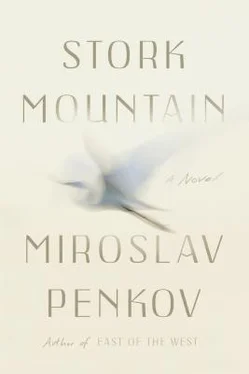Miroslav Penkov - Stork Mountain
Здесь есть возможность читать онлайн «Miroslav Penkov - Stork Mountain» весь текст электронной книги совершенно бесплатно (целиком полную версию без сокращений). В некоторых случаях можно слушать аудио, скачать через торрент в формате fb2 и присутствует краткое содержание. Год выпуска: 2016, Издательство: Farrar, Straus and Giroux, Жанр: Современная проза, на английском языке. Описание произведения, (предисловие) а так же отзывы посетителей доступны на портале библиотеки ЛибКат.
- Название:Stork Mountain
- Автор:
- Издательство:Farrar, Straus and Giroux
- Жанр:
- Год:2016
- ISBN:нет данных
- Рейтинг книги:4 / 5. Голосов: 1
-
Избранное:Добавить в избранное
- Отзывы:
-
Ваша оценка:
- 80
- 1
- 2
- 3
- 4
- 5
Stork Mountain: краткое содержание, описание и аннотация
Предлагаем к чтению аннотацию, описание, краткое содержание или предисловие (зависит от того, что написал сам автор книги «Stork Mountain»). Если вы не нашли необходимую информацию о книге — напишите в комментариях, мы постараемся отыскать её.
Stork Mountain — читать онлайн бесплатно полную книгу (весь текст) целиком
Ниже представлен текст книги, разбитый по страницам. Система сохранения места последней прочитанной страницы, позволяет с удобством читать онлайн бесплатно книгу «Stork Mountain», без необходимости каждый раз заново искать на чём Вы остановились. Поставьте закладку, и сможете в любой момент перейти на страницу, на которой закончили чтение.
Интервал:
Закладка:
Almost four years ago, Grandpa had fixed up two houses in Klisura. He’d fixed the school for himself, then he’d hired a worker from the Muslim hamlet to restore another house. While the worker painted the walls, scrubbed the floors, Grandpa rebuilt the coop, bought chickens, replanted the garden. Then he traveled to Burgas, took the elevator to the eighth floor of an apartment complex, rang the bell. Baba Mina didn’t recognize him until he produced a jar of yogurt from his coat.
She was retired. Dyado Dacho was retired. They hated life in town. And so, before the month was over, they moved to Klisura, into the house that Grandpa had fixed for them.
No, no, I thought, and babbled on and on about how much my muscles hurt. I hadn’t come for a confrontation. I’d come to recognize my grandpa’s strength and, like him, to forgive.
“Thank you, Grandma.” I held her hands and kissed them and she started laughing, lightly.
“You are a funny boy,” she said.
“Funny?” said Dyado Dacho, and sniffed my empty cup. “Try drunk .”
FOURTEEN
“NOTHING IS WRONG WITH ME,” Grandpa was trying to convince me. “I’m healthy as a rock.”
Then why, I asked him, was he sitting so close to the stove? Why did his teeth chatter and why was he sweating rivers?
“Why, why!” he said, and huddled in his coat. But when I passed him a cup of the tisane he seized it with shaking hands and drank it bottoms up.
“What do you want?” he cried. “I’m thirsty.”
I pulled a chair by his side and let the fire in the stove’s belly warm me up. Hot and cold waves washed down my back. A dull pain was settling deep in my muscles. Yet when I took my temperature all was as it ought to be.
“I swear I’m getting sick,” I said, and shoved the thermometer in Grandpa’s mouth.
Disgusted, he spat it out. For a moment he looked determined to fight, but then he shook the thermometer and stuck it under his armpit.
I went to pour myself more tea. Even Saint Kosta seemed sick under his rug in the corner. “He’s shivering,” I said, returning to the stove. “You let him catch a cold.”
“He’s fine,” Grandpa assured me. He turned the thermometer this way and that to read it.
“You happy now?” he said, triumphant. “No fever.”
And just like that the breath caught in his throat. His eyes grew dim.
“I couldn’t stand to see you like you were,” he said. “Resigned. Heartbroken. I wanted you to know you’re not alone. I too suffered once and then lived on. But now I feel so bad, my boy. Much worse. Much worse.”
Saint Kosta had come to his side and Grandpa was petting him with his trembling hands. And watching him like this, I felt a sudden rush of joy.
All this time I’d thought the old man had been telling me his story only so he might get relief. All this time I had been wrong. Once again Grandpa had cut himself for my sake. Once again he was letting his blood replenish mine.
I hadn’t come to Klisura to sell my land and pay off my debt. I hadn’t come here to fall in love and get my heart broken, to help a girl slice the rope and be free, to protect the storks, or even to assist an old man in finding peace through some confession. I hadn’t come to find myself. It was my grandfather I’d come to discover; so that for the first time in our lives, we might become like one.
At least that’s what I wanted to believe now as I watched him sob. And because I believed it, in that very instant, it was so.
FIFTEEN
THRACIANS, Greeks, and Romans, Slavs, Bulgarians, and Turks — only those who never passed through the Strandja never brought it to ruin. How many times had Klisura burned down to the ground? How many times had its people rebuilt, as if out of sheer spite? Let this school be a symbol of our freedom, of our resilience , Captain Kosta had once proclaimed. And if it burns down we shall remake it, so Klisura may be born again. Until in the end — after all this desolation — rebuilding the school had come to signify nothing but rotten luck: erect the school again and before too long the fire will return to consume it.
Well, my grandfather had rebuilt it despite the mayor’s warning. And it seemed only natural, necessary even, that Grandpa would be the one to bring Klisura down again.
Klisura ended with a single word: urbanization. Gone were the cooperative farms, the hundred white sheep. Gone were Baba Mina and the nestinari . The Party was generous enough — as compensation for their relocation all villagers received apartments in a giant block of flats. In Burgas, almost overlooking the sea.
And then, devoid of people, the Christian hamlet was transformed into a border zone. Such was the end. And it was all my grandpa’s doing. He’d fulfilled splendidly his job indoctrinating the Klisuran Muslims. To listen to his recommendation was the least the Politburo could do.
The years passed. Grandpa raised my father an honest, smart, hardworking man. My father met my mother, married her, and I was born. Then Communism fell and Father said, We have no future here . We ran away, while Grandpa stayed behind. When he retired, having heard from his student that Klisura’s school was still in his name, he sold his apartment, pocketed the money, and went back to the Strandja.
He hired a lawyer. The trial began. He would be damned if he let the imam build his rotten turbines.
And now finally I understood what this stubborn fight was all about.
Grandpa wasn’t saving the storks. It was Lenio he was saving.
“When one of the nestinari dies,” Lenio had told him a long, long time ago beside the walnut tree, “a stork is hatched up in a nest. When one of the storks dies, a new fire dancer is born. Take care then, teacher, not to ogle other women once I’m gone. Because I will be watching.”
I wondered if she was really watching now. If she could really see him — sitting by the stove so many years later, petting the stork, singing the songs she once had sung.
After all — I’d seen her world through her eyes. It seemed only fair that she should see my world through mine.
SIXTEEN
NO AMOUNT OF TEA could chase away the fever. Our foreheads had caught fire; the marrow in our bones had come to a boil. Yet we were deathly cold. Teeth chattering, muscles contracting, and chills sloshing up and down our spines like water from an icy stream.
Why then did the mercury refuse to rise?
“Broken,” I’d say, and shake the thermometer as if my spite could fix it. I’d pace across the stifling room and throw more wood into the fire.
“Dear God, my boy,” Grandpa would say, and button up his coat. “Sit down. Stop acting.”
But I wasn’t acting. He was. Pretending he was fine. Donning shirts, wool jackets, an old, moth-eaten hat, and drinking tea by the liter.
“You keep the room so hot,” he’d say. “My throat gets dry. I’m thirsty.”
“Drink water, then. Eat snow.”
No. We were burning up. And with each new day, denying it was proving a greater challenge. And with each new day, our heads were turning faster. We sat in the kitchen, by the stove. We even moved our beds there, too cold to go back to our rooms. We rarely spoke. Instead, we listened to the crackling of the wood and to the whistle of our breathing. Breathe in, breathe out. Breathe in and out. A delirious rhythm that spilled into my dreams.
I sometimes dreamed of Lenio. Sometimes of Grandpa as a young man. But mostly I dreamed of Elif. Each time I met her she wanted me to give her something back. The tresses I’d cut but hadn’t thrown away; the little photograph I cradled under my pillow.
Читать дальшеИнтервал:
Закладка:
Похожие книги на «Stork Mountain»
Представляем Вашему вниманию похожие книги на «Stork Mountain» списком для выбора. Мы отобрали схожую по названию и смыслу литературу в надежде предоставить читателям больше вариантов отыскать новые, интересные, ещё непрочитанные произведения.
Обсуждение, отзывы о книге «Stork Mountain» и просто собственные мнения читателей. Оставьте ваши комментарии, напишите, что Вы думаете о произведении, его смысле или главных героях. Укажите что конкретно понравилось, а что нет, и почему Вы так считаете.











